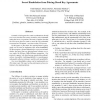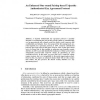41 search results - page 1 / 9 » Secret Handshakes from Pairing-Based Key Agreements |
SP
2003
IEEE
13 years 10 months ago
2003
IEEE
Consider a CIA agent who wants to authenticate herself to a server, but does not want to reveal her CIA credentials unless the server is a genuine CIA outlet. Consider also that t...
CTRSA
2007
Springer
13 years 8 months ago
2007
Springer
Privacy concerns in many aspects of electronic communication trigger the need to re-examine
ICCSA
2007
Springer
13 years 10 months ago
2007
Springer
A tripartite authenticated key agreement protocol is generally designed to accommodate the need of three specific entities in communicating over an open network with a shared secre...
WCC
2005
Springer
13 years 10 months ago
2005
Springer
A secret handshake mechanism allows two entities, members of a same group, to authenticate each other secretly. This primitive was introduced recently by Balfanz, Durfee, Shankar, ...
FC
2007
Springer
13 years 10 months ago
2007
Springer
Abstract. Anonymity-protection techniques are crucial for various commercial and financial transactions, where participants are worried about their privacy. On the other hand, aut...


